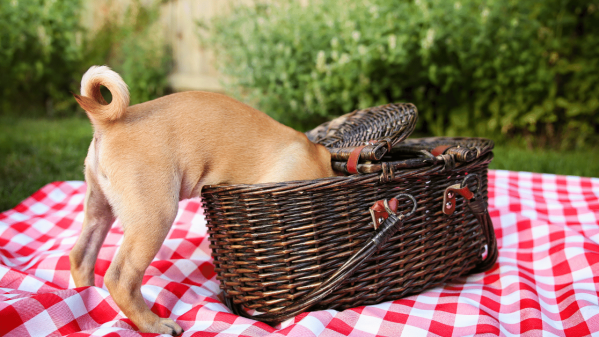When your furry friend shows their puppy dog eyes as you sit down to the dinner table, it can be hard to resist. However, if your dog regularly begs for food, beware. While it's very common for humans to give dogs their dinner scraps, it’s important to be mindful about the foods you share, as certain human foods can actually be toxic for your dog. Be sure to avoid feeding your pup these dangerous foods.
If your dog has ingested something they shouldn't and you're unsure if it's dangerous, you should speak with a vet or poison control hotline immediately.
1. Onions
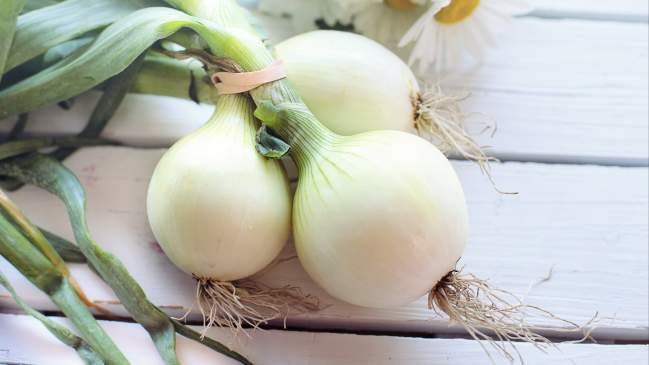
"The food that is most toxic to dogs is onions,” says [Cullen M. Dauchy][2], DVM, veterinarian and former owner of the Katy Veterinary in Katy, Texas. “Most dogs would not eat raw onions, but when cooked with meat (in fajitas, hamburgers, steak, or liver), they’ll eat it like candy!”
According to research published back in August 2001 in [Veterinary Technician][3], onion toxicity occurs in dogs when they eat more than .5% of their own body weight. This means that it can take a fairly large amount of onions to be truly dangerous to dogs. However, it’s better to be safe than sorry, and avoid feeding your dog onions altogether.
A scallion is essentially a young onion, so be sure to avoid them, as well. Both the green part of a scallion and the small white bulb are dangerous for your dog.
2. Garlic
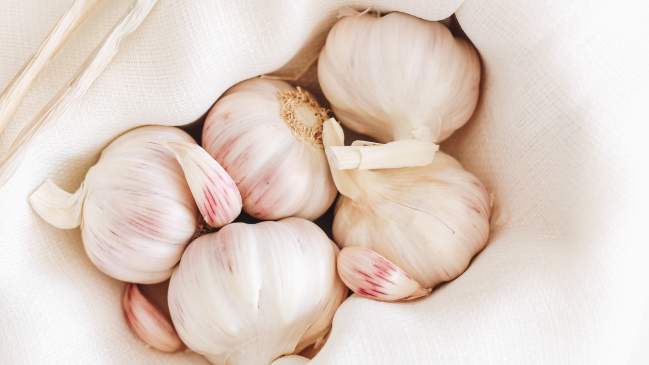
Garlic is particularly harmful to dogs when they chew it, breaking down and releasing its organosulfur compounds. A dog's gastrointestinal tract can easily absorb these compounds, and quickly metabolize them into highly reactive oxidants. Cooked garlic is just as harmful as raw garlic, so make sure you simply keep it away from your pup.
3. Grapes and raisins
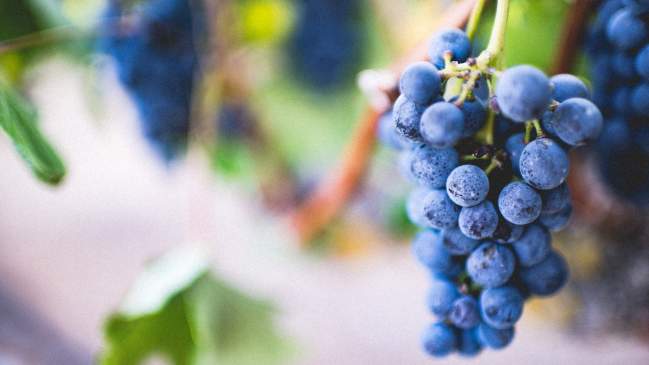
While they’re healthy for humans, grapes and raisins (remember, raisins are dried grapes) can be very dangerous to your pet if consumed in large quantities. No one really knows the specific ingredient or compound in grapes or raisins that’s dangerous to dogs. However, time and time again, vets have seen dogs become sick after eating these fruits.
4. Rhubarb
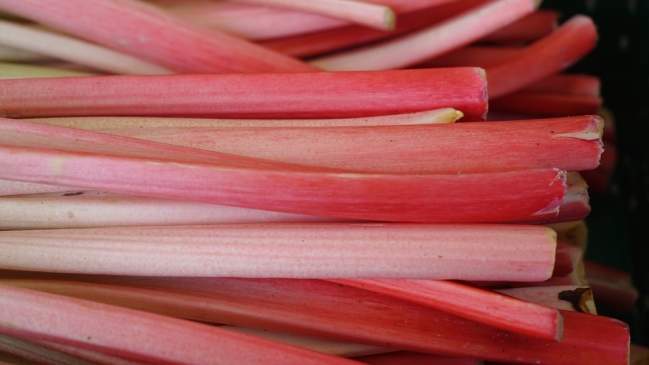
Rhubarb is a plant that people grow in their vegetable or herb gardens that can be used as a pie ingredient. It contains oxalic acid, which becomes lethal to dogs when consumed in high quantities.
Keep the leaves of a rhubarb plant away from dogs, which have a high concentration of oxalic acid in them, making them the most dangerous part of the plant. However, the roots of a rhubarb plant are also dangerous, so make sure your dog doesn’t dig up a rhubarb plant to chow down on the roots.
5. Xylitol
Xylitol is a type of artificial sweetener that is low in calories. You can find xylitol in things like gum, breath mints, candy, baked goods, and ice cream. Ingesting xylitol can lead to liver failure in dogs. If you share something sweet with your dog and they start stumbling, vomiting, feeling incredibly lethargic, or experiencing low blood sugar (and low energy because of it), there’s a chance that your pup consumed xylitol.
6. Chewing gum
Chewing gum may contain xylitol — and, as with humans, dogs cannot digest gum. This means that, if swallowed, gum can cause blockages in your dog's stomach or intestines, which can cause serious damage or even death. If you suspect your dog has swallowed chewing gum, your vet may want to take an x-ray to make sure it’s not causing any issues.
7. Chocolate
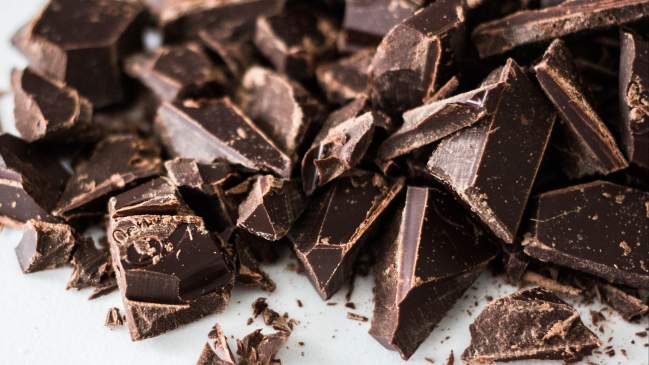
Almost everyone knows that you should not give your dog chocolate.
Chocolate contains methylxanthine, a compound found in cacao seeds and caffeine. Methylxanthines cause vomiting and diarrhea in dogs in addition to seizures and cardiac arrest, as well as a host of other issues, including excessive thirst, panting, and hyperactivity.
A study published in December 2017 in [Veterinary Record][8] found that dogs are much more likely to eat chocolate during the holidays like Christmas and Easter. So, be sure to keep chocolate away from pets, especially during holiday festivities.
8. Caffeine

Caffeine also contains methylxanthine, so you shouldn’t share coffee, espresso beans, Frappucinos, soda, energy drinks, black tea, or anything else that has caffeine in it with your pup.
9. Alcohol

Even though humans drink it to party and unwind, alcohol is poisonous to dogs. It can cause gastrointestinal distress like vomiting or diarrhea, coordination and balance problems (like it does in humans), and a host of other issues: central nervous system depression, tremors, trouble breathing, and even death. So keep happy hour to yourself!
10. Raw meat
Giving your dog a slab of raw steak is a stereotypical image. However, feeding your dog raw meat can increase the risk of exposure to bacteria like Salmonella or E. Coli, which can cause them to get very sick. When a dog gets Salmonella or E. Coli, they experience severe gastrointestinal disturbances, like diarrhea, vomiting, and dehydration.
Although raw diets have become a trend for dogs, you should work with your veterinarian before switching your pup to a raw food diet.
11. Raw eggs

Fully cooked eggs are a great food to share with your pup. Raw eggs, however, contain a substance called avidin that is dangerous to dogs. Avidin is an enzyme that stops dogs from being able to properly absorb biotin, a type of B vitamin. When dogs don’t get enough biotin, it can affect the health of their skin and coat.
12. Macadamia nuts
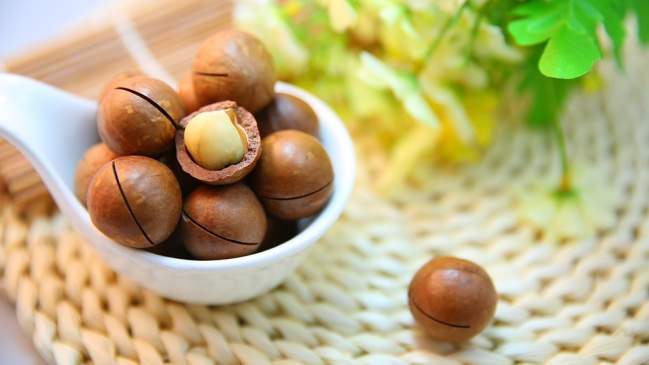
Macadamia nuts are a delicious, rich, and savory delicacy from Hawaii. While these nuts are not often lethal for dogs, if your dog eats them, they may experience weakness in their back legs, vomiting, and diarrhea. However, more serious cases of macadamia nut exposure can result in high fever, inability to walk, vomiting, a prolonged decreased appetite, and stomach pain or a sustained decrease in activity level.
If your dog has ingested macadamia nuts, you should start to see signs of poisoning within 12 hours to 48 hours. If symptoms haven’t appeared by then, they most likely won’t appear at all.
Talk to a vet if your dog eats these foods
You can keep your dog happy and safe by being careful about what human foods you feed your dog and keeping toxic foods out of reach. However, if you’re concerned that your dog may have consumed something toxic or poisonous, talk to a veterinarian and contact the 24-hour [ASPCA Animal Poison Control Center][13] at (888) 426-4435 for help.
